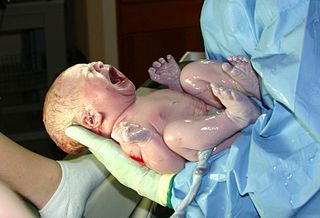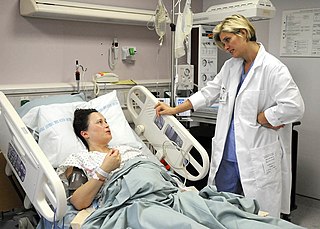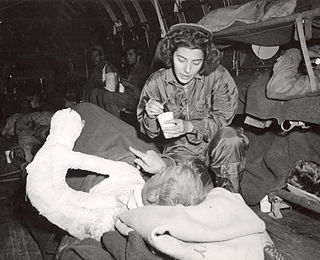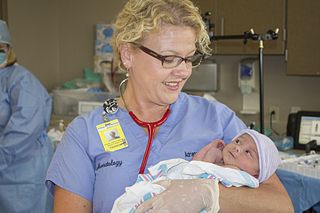In the United States, a registered nurse certified in low-risk neonatal nursing (RNC-LRN) is a neonatal nurse who has earned nursing board certification from the National Certification Corporation in low-risk neonatal nursing.
In the United States, a registered nurse certified in low-risk neonatal nursing (RNC-LRN) is a neonatal nurse who has earned nursing board certification from the National Certification Corporation in low-risk neonatal nursing.

Neonatology is a subspecialty of pediatrics that consists of the medical care of newborn infants, especially the ill or premature newborn. It is a hospital-based specialty, and is usually practised in neonatal intensive care units (NICUs). The principal patients of neonatologists are newborn infants who are ill or require special medical care due to prematurity, low birth weight, intrauterine growth restriction, congenital malformations, sepsis, pulmonary hypoplasia or birth asphyxia.

A neonatal intensive care unit (NICU), also known as an intensive care nursery (ICN), is an intensive care unit (ICU) specializing in the care of ill or premature newborn infants. Neonatal refers to the first 28 days of life. Neonatal care, as known as specialized nurseries or intensive care, has been around since the 1960s.
Pediatric nursing is part of the nursing profession, specifically revolving around the care of neonates and children up to adolescence. The word, pediatrics, comes from the Greek words 'paedia' (child) and 'iatrike' (physician). 'Paediatrics' is the British/Australian spelling, while 'pediatrics' is the American spelling.

A nurse practitioner (NP) is an advanced practice registered nurse and a type of mid-level practitioner. NPs are trained to assess patient needs, order and interpret diagnostic and laboratory tests, diagnose disease, formulate and prescribe medications and treatment plans. NP training covers basic disease prevention, coordination of care, and health promotion, but does not provide the depth of expertise needed to recognize more complex conditions.

In the United States, a Certified Nurse-Midwife (CNM) is a nurse midwife who exceeds the International Confederation of Midwives essential competencies for a midwife and is also an advanced practice registered nurse, having completed registered nursing and midwifery education leading to practice as a nurse midwife and credentialing as a Certified Nurse-Midwife. CNMs provide care of women across their lifespan, including pregnancy and the postpartum period, and well woman care and birth control. Certified Nurse-Midwives are exceptionally recognized by the International Confederation of Midwives as a type of midwife in the U.S.
Nursing credentials and certifications are the various credentials and certifications that a person must have to practice nursing legally. Nurses' postnominal letters reflect their credentials—that is, their achievements in nursing education, licensure, certification, and fellowship. The letters usually appear in the following order:

Critical care nursing is the field of nursing with a focus on the utmost care of the critically ill or unstable patients following extensive injury, surgery or life threatening diseases. Critical care nurses can be found working in a wide variety of environments and specialties, such as general intensive care units, medical intensive care units, surgical intensive care units, trauma intensive care units, coronary care units, cardiothoracic intensive care units, burns unit, paediatrics and some trauma center emergency departments. These specialists generally take care of critically ill patients who require mechanical ventilation by way of endotracheal intubation and/or titratable vasoactive intravenous medications.

Neonatal nursing is a sub-specialty of nursing care for newborn infants up to 28 days after birth. The term neonatal comes from neo, "new", and natal, "pertaining to birth or origin". Neonatal nursing requires a high degree of skill, dedication and emotional strength as they care for newborn infants with a range of problems. These problems vary between prematurity, birth defects, infection, cardiac malformations and surgical issues. Neonatal nurses are a vital part of the neonatal care team and are required to know basic newborn resuscitation, be able to control the newborn's temperature and know how to initiate cardiopulmonary and pulse oximetry monitoring. Most neonatal nurses care for infants from the time of birth until they are discharged from the hospital.

A flight nurse is a registered nurse who specialises in the field of providing comprehensive pre-hospital, emergency critical care, and hospital care to a vast scope of patients. The care of these patients is generally during aeromedical evacuation or rescue operations aboard helicopters, propeller aircraft or jet aircraft. On board a rescue aircraft you would find a flight nurse accompanied by flight medics and respiratory practitioners, as well as the option of a flight physician for comprehensive emergency and critical transport teams. The inclusion of a flight physician is more commonly seen in pediatric and neonatal transport teams. A critical care flight nurse must be able to deal with all age groups with broad critical emergencies. With no physicians on site the nurses scope of practice is expanded. The critical care experience is transferred over to a flight nurse with impacting factors such as altitude and changes in pressure, gravitational forces, and weather. Some patients may experience exacerbation because of factors related to the cabin environment including hypoxia, limited mobility, gas expansion, and risk of injury related to turbulence and resources with definitive care are limited. Aeromedical evacuation crews coordinate with other organizations to plan for the safe and timely care and evacuation of patients. Crews must be prepared for patients with trauma and mental health illnesses.
Nursing is a profession within the health care sector focused on the care of individuals, families, and communities so they may attain, maintain, or recover optimal health and quality of life. They also take on vital roles of education, assessing situations, as support. Nurses may be differentiated from other health care providers by their approach to patient care, training, and scope of practice. Nurses practice in many specialties with differing levels of prescription authority. Nurses comprise the largest component of most healthcare environments; but there is evidence of international shortages of qualified nurses. Many nurses provide care within the ordering scope of physicians, and this traditional role has shaped the public image of nurses as care providers. Nurse practitioners are nurses with a graduate degree in advanced practice nursing. They are however permitted by most jurisdictions to practice independently in a variety of settings. Since the postwar period, nurse education has undergone a process of diversification towards advanced and specialized credentials, and many of the traditional regulations and provider roles are changing.
Obstetrical nursing, also called perinatal nursing, is a nursing specialty that works with patients who are attempting to become pregnant, are currently pregnant, or have recently delivered. Obstetrical nurses help provide prenatal care and testing, care of patients experiencing pregnancy complications, care during labor and delivery, and care of patients following delivery. Obstetrical nurses work closely with obstetricians, midwives, and nurse practitioners. They also provide supervision of patient care technicians and surgical technologists.
In the United States, a registered nurse certified in neonatal intensive care (RNC-NIC) is a neonatal intensive care nurse who has earned nursing board certification. The certification is established by an exam that is one of the core certification exams offered by the National Certification Corporation (NCC).
The National Certification Corporation (NCC) was established for the development, administration, and evaluation of a program for certification in obstetric, gynecologic and neo-natal nursing specialties in the United States. Incorporated in 1975 and governed by a board of directors, NCC's certification program is accredited by the National Commission for Certifying Agencies (NCCA), the accreditation body of the Institute for Credentialing Excellence. By 2009, NCC had awarded over 95,000 certifications and certificates of added qualification.
Certified in Neonatal Pediatric Transport (C-NPT) is the designation in the USA for a paramedic, physician, respiratory therapist, neonatal nurse, nurse practitioner, nurse or physician assistant who has earned certification from the National Certification Corporation in neonatal and pediatric transport. This certificate of added qualification was rolled out in 2009. National Certification Corporation utilizes applied measurement professionals to administer its tests.
A women's health nurse practitioner (WHNP) is a nurse practitioner that specializes in continuing and comprehensive healthcare for women across the lifespan with emphasis on conditions unique to women from menarche through the remainder of their life cycle.

A neonatal nurse practitioner (NNP) is an advanced practice registered nurse (APRN) with at least 2 years experience as a bedside registered nurse in a Level III NICU, who is prepared to practice across the continuum, providing primary, acute, chronic, and critical care to neonates, infants, and toddlers through age 2. Primarily working in neonatal intensive care unit (NICU) settings, NNPs select and perform clinically indicated advanced diagnostic and therapeutic invasive procedures. In the United States, a board certified neonatal nurse practitioner (NNP-BC) is an APRN who has acquired Graduate education at the master’s or doctoral level and has a board certification in neonatology. The National Association of Neonatal Nurse Practitioners (NANNP) is the national association that represents neonatal nurse practitioners in the United States. Certification is governed by the National Certification Corporation for Obstetrics, Gynecologic and Neonatal Nursing Specialties (NCC).
Adejoke Bolanle Ayoola is a Nigerian-American academic and nursing researcher at Calvin University.

A nurse midwife is both a nurse and a midwife, having completed nursing and midwifery education leading to practice as a nurse midwife and sometimes credentialed in the specialty. Nurse midwives provide care of women across the lifespan, including during pregnancy and the postpartum period, and well woman care and birth control.